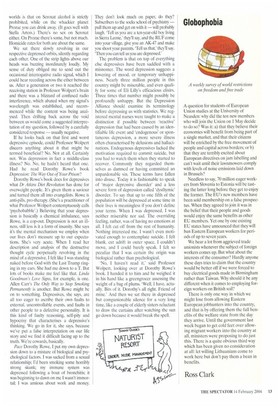Globophobia
A weekly survey of world restrictions on freedom and free trade A question for students of European Union studies at the University of Neasden: why did the ten new members who will join the Union on 1 May decide to do so? Was it: a) that they believe their economies will benefit from being part of a single market, and that their citizens will be enriched by the free movement of people and capital across borders; or b) that they are terribly excited about European directives on jam labelling and can't wait until their lawnmowers comply with levels of noise emissions laid down in Brussels?
Needless to say, 70 million eager workers from Slovenia to Estonia will be tasting the latter long before they get to enjoy the former. The EU's new members have been sold membership on a false prospectus. When they agreed to join it was in the belief that their people and goods would enjoy the same benefits as other EU members. Yet one by one existing EU states have announced that they will ban Eastern European workers for periods of up to seven years.
We hear a lot from aggrieved trade unionists whenever the subject of foreign workers comes up. But what about the interests of the consumer? Hardly anyone these days tries to claim that the country would be better off if we were forced to buy electrical goods made in Birmingham rather than Taiwan. Why should it be any different when it comes to employing foreign workers on British soil?
There is only one way in which we might lose from allowing Eastern European jobhunters into the country, and that is by offering them the full benefits of the welfare state from the day they arrive. Until the government last week began to get cold feet over allowing migrant workers into the country at all, ministers were proposing to do just this. There is a quite obvious third way which has been given no consideration at all: let willing Lithuanians come to work here but don't pay them a bean in benefits.
Ross Clark


































































 Previous page
Previous page